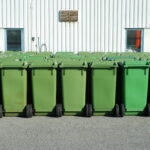Boston College Dining Services collaborated with a student group on campus to create a “trash dinner” comprised entirely of pre-consumer food scraps. The event was designed to encourage students to think about wasted food and creative ways to reduce it. The menu for the trash dinner incorporated parts of food that are frequently discarded such…
A working group led by Keep America Beautiful and the United States Composting Council (USCC) announced new recommendations for organics collection containers. Mimicking the success of equating blue containers with recycling, the group of nonprofit and governmental organizations recommend designating green as the standard color for organic waste bins. The working group offers a number…
Following the success of the Lenox Environmental Committee’s outreach to encourage restaurants in the Town of Lenox to start diverting food scraps for composting, RecyclingWorks in Massachusetts approached the Town of Lee for a similar program. The Lee Greener Gateway Committee and RecyclingWorks reached out to a few dozen restaurants in Lee to promote diverting…
In January, WCAI reported on the organic waste recycling initiative on Martha’s Vineyard. Composting Program Coordinator, Sophie Abrams, is leading the feasibility study and pilot composting program to recycle organic waste on the island. This initiative is in response to the Commercial Organics Waste Ban, which bans businesses and institutions that generate of one ton…
The University of Louisville published an, “Organics Recovery Program Development Tool for Colleges and Universities.” This tool is for institutions interested in organizing or expanding existing organics recovery programs. The guide reviews the methods of organics recovery, the permitting and regulatory issues, institutional partners, funding mechanisms, and operational models. The on-site organics recovery methods include…
The Quad, Boston University’s Independent Online Magazine, discussed the food diversion initiatives currently underway at the university. Hallie Smith, author of the post, used RecyclingWorks Food Waste Estimation Guide, to calculate the average food waste generated at Boston University (BU). To reduce this food waste the university has implemented diversion and prevention programs. According to…
Yesterday, the Massachusetts Department of Environmental Protection (MassDEP) released a new report highlighting the positive economic benefits of reducing food waste. This report studied the effects of the Massachusetts Commercial Food Waste Ban, which prohibits businesses and institutions that generate one ton or more of food waste per week from disposing of that waste in…
The MetroWest Daily News reported on Framingham State University’s effort to reduce wasted food on campus, including source reduction, education, food donation, and composting. FSU uses LeanPath to track and reduce the amount of wasted food. The university donates edible surplus food to local shelters, and dehydrates remaining food scraps to reduce its volume and…
Sustainable America’s blog highlighted Juliet, a Somerville restaurant committed to reducing wasted food. Juliet hosted a dinner for the ReuseConex Conference in October and put the spotlight on turning would-be wasted food into tasty menu items. For the ReuseConex dinner, Juliet worked with local farmers markets and Metro Pedal Power to source the seconds at…
Massachusetts Department of Agricultural Resources (MDAR) is accepting comments and holding a public hearing for the 330 CMR 25.00, Agricultural Composting Program regulation. The public hearing will discuss amendments to the regulation through which Agricultural Composting Operations may register and receive education and technical assistance from the Massachusetts Department of Agricultural Resources (MDAR). Agricultural Composting…

